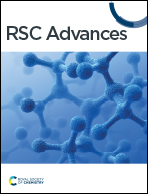Explainable machine-learning predictions for catalysts in CO2-assisted propane oxidative dehydrogenation†
Abstract
Propylene is an important raw material in the chemical industry that needs new routes for its production to meet the demand. The CO2-assisted oxidative dehydrogenation of propane (CO2-ODHP) represents an ideal way to produce propylene and uses the greenhouse gas CO2. The design of catalysts with high efficiency is crucial in CO2-ODHP research. Data-driven machine learning is currently of great interest and gaining popularity in the heterogeneous catalysis field for guiding catalyst development. In this study, the reaction results of CO2-ODHP reported in the literature are combined and analyzed with varied machine learning algorithms such as artificial neural network (ANN), k-nearest neighbors (KNN), support vector regression (SVR) and random forest regression (RF)and were used to predict the propylene space-time yield. Specifically, the RF method serves as a superior performing algorithm for propane conversion and propylene selectivity prediction, and SHapley Additive exPlanations (SHAP) based on the Shapley value performs fine model interpretation. Reaction conditions and chemical components show different impacts on catalytic performance. The work provides a valuable perspective for the machine learning in light alkane conversion, and helps us to design catalyst by catalytic performance hidden in the data of literatures.



 Please wait while we load your content...
Please wait while we load your content...